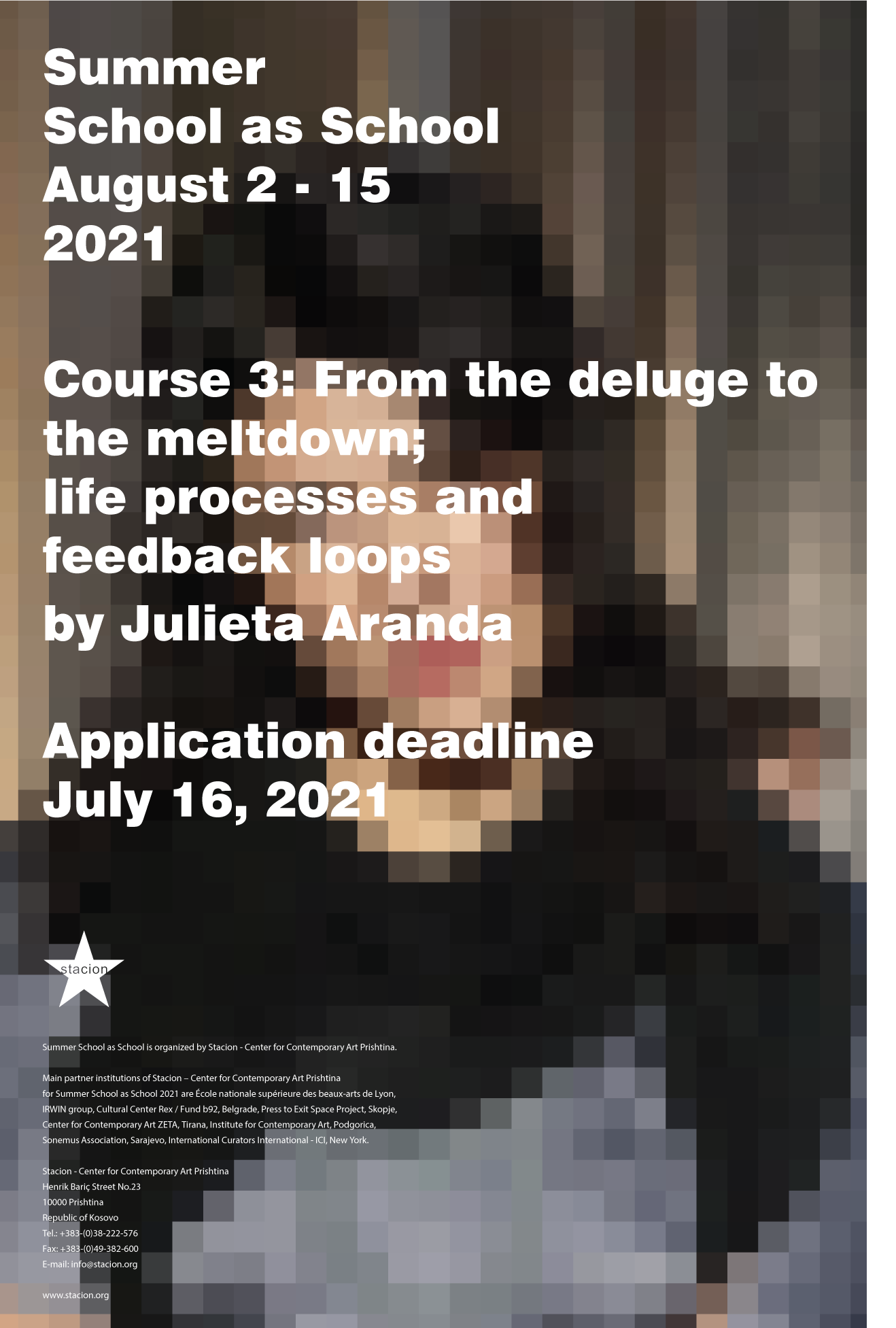
Course 3: From the deluge to the meltdown; life processes and feedback loops
by Julieta Aranda
9 – 14 August, 2021
2 ECTS
Application deadline: July 16, 2021.
Course description
I want to start this class from the idea of “entrapglement” –a portmanteau that I coined to address the mixture of entrapment and entanglement that we face when trying to engage with the worlds around us
.
How do we look at life other than our own? And, once we are looking, from where do we look at it?
Recently, we are jubilant about all life-y things and processes. Matter moves, it breathes, it wriggles! It is alive! But if we end up dealing with such processes merely as metaphors and allegories for our own world and our own life, we end up once again confusing the forest for the trees.
Perhaps it will be helpful to take look at living processes and sub-routines using the lens of chemo-ethnography, where ethnographers move beyond enthusiasm “about the liveliness of ‘matter itself,’” and instead attend to “the complexities, frictions intractabilities, and conundrums of ‘matter in relation’” so that we can critically considers the slippages that occur when we focus solely on the molecular register and clamber toward new techniques for making knowledge that risk reinforcing age-old socio-material fault lines.
Through the seminar, we will parse out the relationships we have to life and matter from the narrative standpoint of water -as the main substrate of life, but also as the plot device that heralds extinctions. We will look at the temporality of life that is incompatible with life, and will try to make sense of what kind of cultural production can fully address the multiplicity of worlds that we move through and that we are part of.
Biography
In her artistic practice, Julieta Aranda (Mexico City, Mexico) composes sensorial encounters with the nature of time and speculative literature. She observes the altering human-earth relationship through the lens of technology, artificial intelligence, space travel and scientific hypothesis. Working with installation, sculpture, video and print media, she is invested in exploring the potential of science-fiction, alternative economies and the ‘poetics of circulation’. Her projects challenge the boundaries between subject and object while embracing chance encounters, auto-destruction and social processes.
Julieta Aranda‘s solo exhibitions have been held at Galería OMR, Mexico City, Portikus, Frankfurt, Francesco Pantaleone Arte Contemporanea, Palermo, New Museum, NY, Guggenheim Museum, NY, Museo d’Arte Contemporanea Villa Croce, and the Kunstverein Arnsberg amongst others. She has participated in numerous international group exhibitions including Fridericiaum Museum, Kassel, Bildmuseet, Umeå, Martin Gropius Bau, Berlin, Public Art Munich, Witte de With, Rotterdam and the Museum of Contemporary Art, Detroit. Julieta Aranda was part of documenta 13 in Kassel, and of the 10th Momentum Biennale, 12th Istanbul Biennale, VII Havana Biennale, 8th Berlin Biennale; the 56th Venice Biennale, the 2nd Moscow Biennale, the Liverpool Biennial and the 9th Lyon Biennale amongst others; and her work was exhibited in the Latin American pavilion at the 54. Venice Biennale.
As an editor of e-flux journal, and co-director of the online platform e-flux together with Anton Vidokle, Julieta Aranda has developed the projects Global Contemporary Travel, Time/Bank, Pawnshop, Supercommunity, and e-flux video rental, most of which started in the e-flux storefront in New York, and have travelled to many venues worldwide.
Participation
10 participants will be selected to participate in this course. Eligible participants must read the Terms, fill out the application form, upload the required documents and submit the application form. Incomplete applications will not be considered.
Scholarships are available for participants from Kosovo.
A limited number of scholarships, that cover the participation fee, are available for international participants.